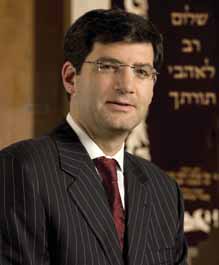From the Desk of Rabbi Steven Weil, Executive Vice President
“Knock, knock.”
“Who’s there?”
In my family, this is not the opening line to a joke. It is one of the strictest rules we have. I take it very seriously because I was the one who failed in this matter. One evening, a young man came to our door. He claimed to live on our block, and he was going door to door, hoping to raise money for his class trip. Wanting to be a good neighbor I invited him in, gave him a drink and in the course of friendly conversation found out that he was definitely not a neighbor, and surmised that there was likely no class trip. I made a point of letting my children know how thoughtless it was of me to let a total stranger into our home, and that “who’s there?” is the most important question they could ask.
“Who’s there?” is not only a relevant question when someone is knocking at your door. It goes much deeper than that. Moshe Rabbeinu was biologically Jewish, grew up in the palace of the Pharoah and was raised as the prince of Egypt. Yet he “went out amongst his brothers and observed their burdens” (Shemot 2:11). He witnessed an act of violence: a powerful Egyptian taskmaster striking a helpless, defenseless Jewish slave. The pasuk continues and tells us that Moshe “turned this way and that and saw that there was no man, so he struck the Egyptian and hid him in the sand.”
The simplest way to understand what happened is that Moshe looked to see if anyone was watching who might report his act of aggression and rebellion against Pharoah. When he saw that there were no eyewitnesses, he killed the brutal Egyptian. Rabbi Isaac Bernstein, zt”l, offers a beautiful alternative for understanding Moshe’s involvement in this encounter. Up until this point, Moshe had two identities. He was born Jewish, the son of Amram and Yocheved, and he was raised as an Egyptian by the daughter of Pharoah. These two components were not conflicting; they both defined who he was. He never before had to choose sides. But at that moment, when he saw his Egyptian brother mercilessly beating his Jewish brother, Moshe knew he had to make a choice. “He looked this way and that way” within himself. And whom did he see? “He saw that there was no man.”Moshe hadn’t taken a stand. Moshe hadn’t defined himself. But now that both components of his identity were in conflict, he was forced to choose a side. “So he struck the Egyptian and hid him in the sand.”He literally struck an Egyptian, but he figuratively struck the Egyptian part of himself and buried it in the sand, never to be resurrected. After this turning point in Moshe’s life, “who’s there?” was no longer a question. Moshe knew exactly who he was, and in making that choice, he ultimately aligned his identity and destiny with that of the Jewish people.
I have had the privilege of being part of the Orthodox Union since last April. In the short time that I have been here, I have learned so much about the people and the projects of this institution, and how we are identified by the greater population. Everyone knows that our kashrut standards are impeccable, and that NCSY inspires countless teenagers across the country. But like Moshe, like all individuals who struggle to define themselves, we as an organization representing Orthodox Jewish populations around the globe must also make the choices that define who we are.
I have spent much of my time visiting the “out of town” communities, listening to the rabbis, the day school principals and the lay leaders about their needs, and finding out how we at the OU can support their efforts on the frontlines serving Klal Yisrael. I have spent time with some of the dynamic couples on secular campuses who are part of the Heshe and Harriet Seif Jewish Learning Initiative on Campus (JLIC) and who interact with Jewish students 24/7, serving as their link to Jewish life and Jewish identity. I have seen that there are so many worthy causes and projects, and so many people who are selfless in their devotion to taking care of the very real needs of our people.
We want to continue our mission of serving our community by defining what our strengths are, what impact we can have and what are the best and most effective uses of our resources and talent. In short, we want to ask, explore and ultimately answer one of the most important questions there is: “Who’s there?” And like Moshe, we hope that the choices we make will positively and irrevocably shape the destiny of the Jewish people.

